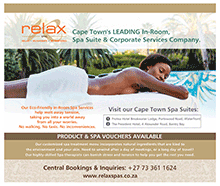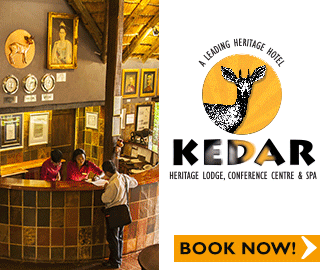

The Business of Luxury Travel: Is Africa Ready?
BY BRUCE GERMAINE | 12 JUNE 2017 05:26
Industry insiders say a change is afoot, with more travellers personally redefining their definition of “luxury travel”. For a lot of travellers, luxury means a limousine transfer from an airport, 1,000-thread count bed sheets and three-star Michelin restaurants.
The more a traveller is used to luxury, the higher up the pyramid their expectations are. Luxury travellers are generally at the level of expecting exclusive experiences. The VIP demands are limited to a small group, used to the highest level of luxury in their daily lives.
Luxury travellers are generally looking for such things as; personalised service (preferably one-on-one), good quality beds with good quality bed linen, sophisticated design, reliable transport, comfortable seats (with plenty of legroom) when travelling, food and wine of outstanding standards, exclusivity, positive and professional interaction with staff (such as greetings by the doormen) to mention but a few.
Luxury travel is no longer a niche sector. It’s growing at a faster rate than the ‘overall’.
According to Amadeus’ latest report “Shaping the Future of Luxury Travel” this is not about to slow down: Between 2011 and 2015, luxury travel grew by 4.5% compared to a 4.2% growth for overall travel. The growth rate in outbound luxury trips in the next 10 years is projected at 6.2%. That’s almost a third greater than overall travel (4.8%).
The global growth of 7% of the luxury hospitality market is said to be powered by the changing lifestyles of new affluent middle classes around the world. These middle class people, who are experiencing increased wealth, have the possibility to travel around the world. They have started exploring the possibility of travelling long-haul to new destinations and are encouraging their friends to also explore the corners of the globe. That is also why luxury hotels have noticed an increased demand from the growing middle classes in the developing markets.
The term “Luxury Travel” has in its essence changed from what we used to know. If it hasn’t already, it will become less exclusive as more people are accessing the more dazzling side of travel. What is considered luxury today will continually shift to become mainstream tomorrow.
All this change is mostly due to the way, in which travel businesses control their standards. This in turn has much larger effect on the remaining parts in the industry.
African Travel Inc., the Glendale, CA-based tour operator, is among safari suppliers that have introduced more affordable itineraries, while maintaining luxury standards. Feedback from agents, it turns out, gets some of the credit.
“When our guests and their agents recommend additional destinations and experiences for safaris, we listen and make it happen,” said Sherwin Banda, president of the company, which was founded 40 years ago and is now part of The Travel Corp. “When visiting our agent partners, many consultants requested luxurious and value-packed itineraries for their guests. Agents said their clients have become accustomed to luxury travel and are looking for affordable tours to exotic destinations. As a result, ATI has implemented new safari vacation packages, where heart-pounding wildlife safaris are paired with outstanding food, service and accommodations, plus unforgettable interactions with the locals for a glimpse into Africa at its most authentic.”
Africa’s growth in the luxury travel industry is quite impressive with leisure travel being ahead of business travel. The recent economic growth in African countries such as Nigeria and Ghana give travel and tourism a hefty boost.
According to the “Shaping the Future of Luxury Travel”, there are various fascinating traveller types globally; “Simplicity Searchers” value ease and transparency in their travel planning and holidaymaking above all else, and are willing to outsource their decision-making to trusted parties to avoid having to go through extensive research themselves.
“Reward Hunters” focus on self-indulgent travel that will often mix a focus on luxury with self-improvement and personal health. The seeking of ‘reward’ for hard work in other areas of their life is what motivates them. They are looking for luxury experiences that are several notches above the everyday.

"Luxury means different things to different people and this is especially true today. As emergent middle classes seek the material aspect of luxury travel, more mature markets are craving a new, evolved kind of luxury. This is why offering luxury customers a relevant personal and exclusive experience will become even more crucial than it is today.”
“Obligation Meeters” have their travel choices restricted by the need to meet some bounded objective. In addition to business travel commitments, these obligations can include personal obligations such as religious festivals, weddings and family gatherings. Business travellers are the most significant micro-group of many falling within this camp. Although they will arrange or improvise other activities around their primary purpose, their core needs and behaviours mainly are shaped by their need to be in a certain place, at a certain time, without fail.
The other three Traveller Tribes are “Ethical Travellers”,” Cultural Purists” and “Social Capital Seekers”, but do not tend to necessarily display obvious luxury behaviours.
As middle-class markets develop and mature across the globe, the luxury hospitality market is expanding to meet their needs. A recent report from Transparency Market Research found that the global luxury hotels market will continue to expand at CAGR (Compound Annual Growth Rate) of 4% from 2015-2021. The increased wealth and refined travel aspirations of these new middle classes will compel them to invest in long-haul travel to new destinations, thus encouraging their peers to follow suit and explore other corners of the globe.
Newly prosperous travellers are emerging from different regions around the world, including Africa. For the past few years, African travellers have continuously chosen the front section of the plane for their international travels. The demand for outbound Business Class flights from Africa grew until 2013, and has remained steady ever since. The demand for First Class flights in Africa dropped considerably in 2014, but has also remained flat since that time.
Luxury hotels have consequently noticed an increased demand from the growing middle classes in the developing markets. The luxury hospitality market’s global growth of 7% is said to be fuelled by the changing lifestyles of new affluent middle classes around the world. People from the middle class, who are experiencing increased wealth, now want to travel around the world. Not only have they started exploring the possibility of travelling long-haul to new destinations, they are also encouraging their friends to also explore the corners of the globe.
Some of the more significant findings from the “Shaping the Future of Luxury Travel” are; North America and Western Europe account for 64% of global outbound luxury trips, despite only making up 18% of the world’s population, from 2011-2025, Asia Pacific’s luxury travel market will see faster overall growth than Europe’s - but this growth will decelerate from 2015-2025, India’s luxury market CAGR of 13% is higher than any of the other BRIC nations and is the highest of the 25 countries explored in the report, a human desire for more rewarding experiences provides an essential catalyst to evolve and improve travel industry quality and service standards, a hierarchy of luxury travel needs is identified, ranging from 5-star quality and service standards to exclusive VIP privacy and security.
“Luxury means different things to different people and this is especially true today,” said Rob Sinclair-Barnes, Strategic Marketing Director, Amadeus IT Group. “As emergent middle classes seek the material aspect of luxury travel, more mature markets are craving a new, evolved kind of luxury. This is why offering luxury customers a relevant personal and exclusive experience will become even more crucial than it is today – it will be a differentiating factor between old and new luxury.
“Understanding your business’s role in delivering an end-to-end luxury experience for a traveller is key to improving collaboration, and reinforcing an industry-wide push for consistent luxury service. Exploring the latest technologies and innovations for making the industry work better as a whole is key to achieving a new level of luxury that has never existed before.”
Luxury travel continues to grow steadily all year round, with somewhat surprising results as the results seem to be bucking the trends, especially in the face of today’s economic climate.










